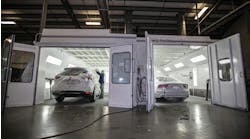Safeguarding a shop’s assets is an important routine. Setting up internal controls, insuring property, counting inventory, maintaining the equipment and vehicles are all standard things an owner looks after.
But are you protecting your most important and valuable assets — your people? Do you periodically stop and reflect on your supply of highly capable individuals? What are you doing to retain this talent?
The cost of hiring key shop talent is high. It takes time, and even the best searches contain significant risks with potential failure.
It is very easy to be buried in the forest and overlook the people who are performing well. The “reactive” shop owner devotes the bulk of his or her time and energy to those who never quite get it together. You can’t fix broken. The compelling need to fix problems can lead the owner to miss the people who get results. It is not uncommon to see time, effort, procedures and processes neutralize weaknesses rather than capitalize on strength.
How do you ensure that the best talent in the shop is retained?
First identify where the talent exists. Look beyond the chatter and appraise the bottom line produced by each employee. Avoid the sizzle and look for the steak. Without such identification, it is impossible to build in the commitment and retain the talent.
What questions might be asked in order to ensure that the necessary steps are taken to retain the shop’s top talent?
Why have talented people left the shop in the past? The true reasons often are whitewashed because many people focus more on courtesy than true candor in their exit interview. Discuss such factors as compensation, opportunities for growth and personal development. It is critical to find the true reasons. Talented people may be controversial because they demand a lot. People often respond to such individuals by harping about their quirks rather than focusing on results. Investigate tolerance of quirks as a factor in the decision of talented people to leave the shop. Is a focus on conformity, not results, driving talent out of your business? It is well known that good people leave a shop because bad people stay. Is accountability throughout the shop in check?
Why do talented people stay? What is it about your shop that talented people like? Does your business encourage creativity? Allow freedom? Are they empowered? Is it an exciting place to work? Knowing why will help ensure that other talented people remain with your company.
Are you paying attention to the talented people in your shop? Are you giving enough positive feedback to talented individuals? Talented people need recognition. Do you stay on top of accomplishments so that you can deliver the appropriate encouragement?
Are you consciously putting enough challenges in front of those people who deliver results? Results-oriented people look for more difficult challenges. Determine whether their learning curve is steep enough. But don’t move people on without recognizing accomplishments or life in your shop can seem like an endless treadmill.
How equitable is the compensation among your key employees? Is there enough differential between those who deliver results and those who don’t? Highly talented people often view compensation as an indicator of their worth to your shop. If compensation does not correspond to delivered results, you risk losing the more talented individuals. Though seldom a genuine, long-term motivator, it can be a powerful source of dissatisfaction.
Are you providing what they need to get results? One of the common frustrations of talented people is the struggle to obtain the resources necessary to get the job done. It is imperative to break through the impediments, both monetary and procedural, which are so hard on human talent.
To what extent are you giving more talented individuals exposure to the industry? Keeping talent hidden makes your shop look paranoid and insecure. There is always a risk that visible people might be lured away, but allowing them opportunities to experience the breadth and depth of the automotive aftermarket industry speaks volumes about your belief in them.
To what extent are you factoring individual difference variables into your thinking about retaining highly talented people? The powerful factor that binds one person to the organization may mean little to another. Get to know about each individual and build a sense of what each requires to do their job.
To what extent do talented individuals feel they are progressing and developing? People need to feel that they are gaining skills, knowledge and also building a career. Development reviews and performance appraisals should be calibrated to determine whether your top performers are satisfied with their progress.
Examine your relationships with people who deliver the results in your company. Talented individuals are like clients; it is harder to obtain new ones than to retain the old. Both will stay if they feel appreciated and experience a genuine commitment.






